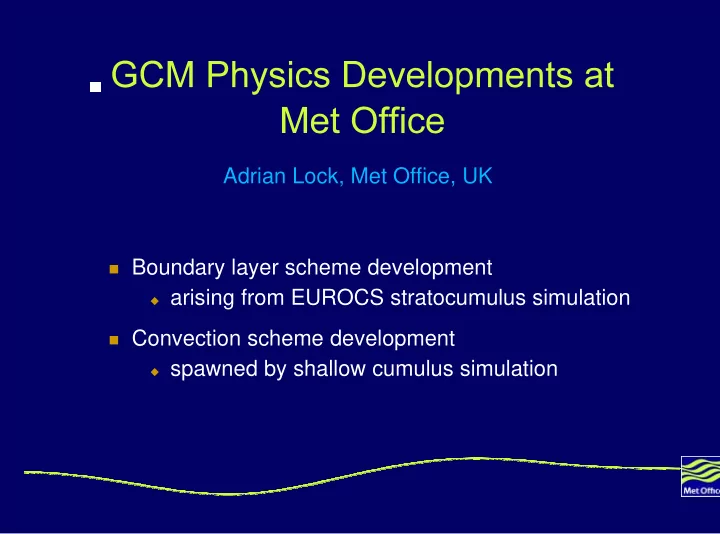

Adrian Lock, Met Office, UK � Boundary layer scheme development � arising from EUROCS stratocumulus simulation � Convection scheme development � spawned by shallow cumulus simulation
Boundary layer scheme plus development � 1 st order specified K-profile closure � Diagnose vertical extent of K-profiles by imposing a limit on the buoyancy consumption of TKE, using subgrid cloud-base height diagnosis: z z i i w b ' ' 0 dz D w b ' ' 0 dz � � � � � � � � � � � � � 0 0 With D=0.1 taken from the LES of the diurnal cycle of marine stratocumulus
SCM stratocumulus: decoupled phase (11Z local time) Inversion top K h Cloud base If well-mixed Decoupled surf K h � l profile Buoyancy flux K profiles
Occurrence of Total cloud decoupling fraction New Impact of the new method subgrid cloud-base diagnosis JJA means Old method Difference
Climate model cloud fraction – 5 year JJA mean New model ISCCP New model (HADGEM1) – ISCCP Old model (HADAM3) – ISCCP
Convection scheme plus developments � Gregory and Rowntree (1990) mass-flux scheme (with RH-dependent CAPE closure for deep convection) plus: � Trigger at the LCL using explicit cumulus diagnosis � Cap K-profile at LCL � Shallow convection parametrized with: � Grant and Brown (1999) entrainment/detrainment rates � m LCL = 0.03 w * � parcel just saturated with w � v LCL = - 0.2 w � v S
� Parcel perturbation gives warmer/drier sub-cloud layer � Larger entrainment/detrainment rates give � Colder and moister cloud layer � Lower cloud top Profiles at end of simulation Revised Revised Original Original
Cross-section 1, July mean, New – Old Theta � Same warmer/drier sub-cloud layer Humidity � Same colder and moister cloud layer � Same lower cloud top
Original Revised
� Cloud-top lower but little impact on cloud cover except towards the ITCZ
Massflux time-height sections from a point near Hawaii Original Revised � Partly a more robust trigger, partly more balanced increments...
NWP representation of stratocumulus (T+12) Old NWP model (Ri bl scheme) Radiosonde ascent New NWP model (non-local bl scheme)
� Both K-profile boundary layer and revised convection schemes are now operational for NWP � Further work required on the interaction between cumulus and stratocumulus � Extend the principle of K-profile mixing between layer interfaces to: � cumulus convection (both shallow and deep) � stable boundary layers
Recommend
More recommend